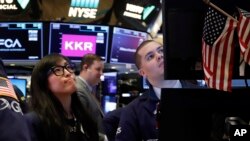The economic effects of the deadly coronavirus sent global stock and oil prices plunging Monday, while the infectious disease forced China to postpone its annual legislative session and posed new health threats across the world.
Key stock indexes in the U.S. plummeted about 3% in afternoon trading in New York, following sharper losses in European markets and more modest drops at Asia's top exchanges.
Brent crude, the global oil benchmark, dropped nearly 5% to $55.08 a barrel, its biggest decline in almost five months. Gold prices, meanwhile, rose nearly 2% to more than $1,676 an ounce, its highest price in more than seven years as investors looked for a safe haven to park their assets in the face of stock price volatility.
A day after Chinese President Xi Jinping called the infectious disease a "crisis" that would hurt the country's economy, Beijing said the National People's Congress would not meet as scheduled on March 5. A new legislative start date would be decided later, China said.
Beijing also retreated from an earlier announcement that it would ease travel restrictions on Wuhan, the city at the epicenter of the coronavirus outbreak, in a signal that China was still concerned about the spread of the virus within the country even as new outbreaks were reported in places far removed from China.
China reported 150 more deaths from coronavirus and 409 more affected people, bringing the cumulative death toll to nearly 2,600 and the number of cases to more than 77,000.
Nearby South Korea announced 231 new coronavirus cases on Monday, bringing its total number to 833, while confirming two more deaths to bring its total to seven. Afghanistan reported its first coronavirus case, while Kuwait, Iraq and Bahrain reported new cases.
Italy was hit hard, as authorities called off all Carnival events and major football matches, while closing public sites, including the famed La Scala opera house. It has reported more than 200 coronavirus cases, the largest known outbreak outside Asia.
Italian Prime Minister Giuseppe Conte said the government is looking into "extraordinary measures" to stop further infections.
French Health Minister Olivier Veran said he would talk with his European counterparts soon to discuss how best to cope with a possible epidemic in Europe.
"Tonight there is no epidemic in France. But there is a problematic situation at the door, in Italy, that we are watching with great attention," Veran told a news conference.
Israel disinvited 3,000 international runners who had signed up for Friday's marathon in Tel Aviv, saying the race could go ahead as planned, but without the competitors arriving from outside its borders.
"The past few weeks has demonstrated just how quickly a new virus can spread around the world and cause widespread fear and disruption," said Tedros Adhanom Ghebreyesus, the director-general of the World Health Organization.
Before South Korea's new cases were reported Monday, the country raised the alert level to red, the highest level, and President Moon Jae-in urged officials to not hesitate to take "unprecedented powerful measures" to contain the outbreak. South Korea has the most infections outside of China.
"The next few days will be crucial," he said following a government meeting on the virus. Under the alert level, authorities have the power to close schools and limit public transportation. The start of the new school year has been delayed one week.





